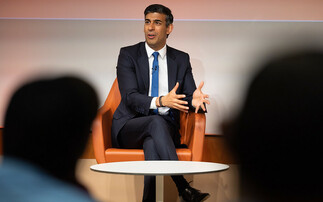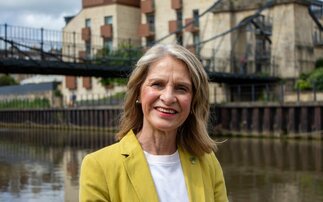The Paris Agreement's coming into force is an historic achievement, but its early prospects now rest with the US electorate
Like a Las Vegas wedding, the celebrations could prove short-lived. The coming into force of the Paris Agreement, years earlier than expected, continues a remarkable run of form for environmental diplomacy over the past two years. The US and China climate bilateral agreement, record levels of clean tech investment and renewables deployment, the EU's climate package, the UN Sustainable Development Goals, the Paris Agreement, the Montreal Protocol amendment on HFCs, ICAO's aviation emissions mechanism, and now the early ratification of the Paris deal have all served to provide an essential reminder that international co-operation, mutually assured sustainable growth, and a recognition of shared risks and opportunities, of shared humanity, can still prosper, even against a backdrop where these precious values are derided and denigrated by the worst amongst us.
And yet while the formal triggering of the Paris Agreement will be rightly celebrated, everyone knows the deal is nothing more than an important staging post on the path to a genuinely net zero emission economy. And they also know that the journey on from this staging post could take a dangerous and potentially catastrophic detour next week when the US goes to the polls. The cheers among green businesses, investors, and environmentalists sparked by the Paris Agreement's entry into force could die in their throats on Wednesday morning with the election of President Trump.
Hillary Clinton remains narrowly ahead in the polls and it is still hard to see Trump sweeping the swing states he needs to secure victory in America's byzantine electoral college. But the most crassly offensive and demonstrably least qualified candidate in the history of the union is still very much in the race, making the election of a pro-coal, climate denying, pollutocrat favouring, populist demagogue who has promised to "cancel" the Paris Agreement a distinct possibility.
Thankfully, there are several reasons to remain cautiously optimistic a Trump presidency need not prove a full-blown catastrophe for either the Paris Agreement or global efforts to tackle climate change and build a green economy.
Firstly, Trump cannot simply cancel the Paris Agreement. In fact, it'll take time for him to pull the US out of the deal, and even if he did end US involvement the Kyoto Protocol provides a precedent for a climate treaty operating with some success despite US opposition. China is not about to tear up its decarbonisation and clean air plans in the event of Trump winning Florida; the EU won't ditch its emissions plans; India won't cut its investment in solar; Chile, South Africa, UAE, and all those other regions where renewables undercut fossil fuels (including Texas) are not about to dilute their clean energy ambitions.
Secondly, unless Trump proves himself to be the dictator some fear he will quickly find his powers are surprisingly limited. Delivering his polluting energy strategy will require significantly more focus, compromise, and political savvy than he has demonstrated to date. A President Trump would not be able to stop many US states from accelerating their own low carbon transitions, he would not be able to stop US utilities switching to lower cost clean technologies, and he will not be able to steamroller the legal and Congressional challenges that will inevitable push back against his pro-coal vision.
Yes, he will be able to cancel many of the Obama administration's executive actions that underpin America's Paris Agreement INDC action plan. But even here many states will defy him. Meanwhile, it is often forgotten that Obama's use of the Clean Air Act to crack down on greenhouse gas emissions was not just welcome, it was required by law following a Supreme Court ruling that emissions present a threat to human health. Trump's climate-denying, high carbon strategy will quickly find itself tied in legal knots as the force of that historic ruling is brought to bear. The famed US system of checks and balances may face one of its biggest tests yet in the form of the perma-tanned, Putin fanboy, but there are reasons to believe it will do its job and deliver a degree of policy stability.
Thirdly, and most importantly of all, even the President of the United States struggles to stop the tide of epoch defining trends. As Obama has warned, once you are in the Oval Office the reality of climate change hits pretty hard as you have to deal with the fallout. Equally, Trump can no doubt offer succour to the fossil fuel industry, but he will struggle to reverse the trends towards extremely popular and increasingly cost competitive renewables, electric cars, and smart grids. A senior executive at Shell this week revealed the company thinks oil demand could peak within five to 15 years. President Trump wouldn't be able to halt that global trend.
It was this reality that was behind Chinese diplomat Xie Zhenhua's unprecedented warning that Trump's approach to climate action would be in defiance of global trends. "If they resist this trend, I don't think they'll win the support of their people, and their country's economic and social progress will also be affected," he said pointedly. "I believe a wise political leader should take policy stances that conform with global trends."
And yet, faced with the reality of Trump and Trumpism this optimism feels a little like looking at global temperature trends and kidding yourself everything will definitely be OK. Feminism and respect for women is a global trend, but Trump has no problem defying it. A recognition that war crimes are wrong is a global trend, but Trump has no problem defying that either. The concept of civil rights and an awareness that racist populism is extremely dangerous is a global trend, but Trump has no problem defying it. Understanding that bragging about sexual assault is contemptible is a global trend, but… you get the idea. Trump is not a wise political leader. He is many things, but wisdom is not part of his modus operandi.
President Trump and a Republican base emboldened by the realisation that nativist populism offers a route to power may not be able to reverse global green economic trends, but they can stall them. If Trump can get his pro-coal policies through he could reverse the historic decline in US emissions. If he can halt US funding for climate projects overseas he can reignite the most combustible issue at the UN climate negotiations. And if he can embed climate scepticism in the White House he can give those other governments around the world that have always favoured a slower approach to emissions reduction all the cover they need to start watering down their own efforts.
Much of the analysis suggesting Trumpism heralds an end of civilisation is guilty of hyperbole, but in Trump's dismissal of climate risks at the last point in history at which catastrophic impacts can be averted and in his staggeringly cavalier misunderstanding of the concept of a nuclear deterrent the caricature of this shambling excuse for a tycoon as one of the horsemen of the apocalypse could yet prove terrifyingly accurate.
In this context a vote for a Green Party candidate who has done little to distinguish herself even as a credible repository for protest votes looks the very apotheosis of self-indulgent environmentalist self-harm.
Regardless of what happens next week the Paris Agreement will endure and will continue to deliver on many of its goals. Too many of the world's most powerful economies and most innovative businesses understand mitigating climate risks, bolstering climate resilience, tackling air pollution and embracing clean technologies is essential to future security and prosperity. The Paris Agreement makes it easier for these economies to accelerate their low carbon transition. As such it deserves to be celebrated today.
Moreover, Clinton remains the firm favourite to win next week. Even the narrowest of victories for the Democrats would see the US build on the Obama administration's climate plan, mobilising further investment in clean energy and further entrenching the principles of the Paris Agreement in the world's largest economy. The Republican Party shows no signs of addressing its science and logic-defying love of pollution and at some point in the future it seems inevitable a US President who is viscerally opposed to protecting our shared environment will return to the Oval Office. But every delay to that sad day of reckoning gives the global green economy more time to establish sustainable development models as the default approach to economic growth.
However, if Trump somehow wins, turning the walking embodiment of the worst impulses of the GOP's id into the most powerful man on the planet, then it is absolutely self-evident the Paris Agreement will spend the first four years of its existence struggling and failing to live up to its enormous potential.
Writing today, UNFCCC Executive Secretary Patricia Espinosa and President of COP22 Salaheddine Mezouar declared that "humanity will look back on November 4, 2016, as the day that countries of the world shut the door on inevitable climate disaster and set off with determination towards a sustainable future". They may well be right, but by this time next week an update could be needed: "Humanity will look back on November 8, 2016, as the day that the most powerful country of the world opened the door on inevitable climate disaster and set off with determination towards an apocalyptic future".
Just like a Las Vegas wedding anyone planning to celebrate the Paris Agreement today would be advised to sleep on it for a few more nights.









